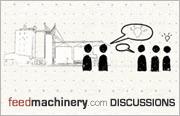Canada - The Animal Nutrition Association of Canada reports drastic reductions in livestock numbers have dramatically reduced demand for feed products forcing widespread consolidation within the animal feed industry.
The Animal Nutrition Association of Canada represents Canada's animal feed mill operators and their suppliers.
Manitoba operations manager Herb Schultz says the swine industry, which accounts for about 70 percent of Manitoba's feed market, has taken a number of hits in the past year which has dramatically impacted feed demand costing jobs.
Clip-Herb Schultz-Animal Nutrition Association of Canada, said "It used to be our industry was 24 hours five days a week and that was the norm.
All the mills were running at that because they had enough orders out there.
Now some mills are running at about 25 to 30 percent capacity and meantime what they've done is, if they have other mills, they've shifted more production to those to keep them running more efficiently so there's fewer people working in some of the mills.
Even if you're seeing the feed company trucks on the highway, you're probably seeing the logos and they're still all around, but you're not seeing the trucks as often anymore.
They're down quite a bit in terms of their haulage.
In terms of our demographics inside the industry there have been some layoffs, minor ones, but a lot of this has been handled by attrition.
There was people saying well I'll retire or salesmen for example says no I've got another job so I'm going.
So there wasn't this trauma that you were doing massive layoffs but that option has pretty well run its course.
You're now looking at if you have to reduce your operations there's nobody lining up for a bit of an incentive to leave or they're close to retirement so they'll go anyway.
Truckers are dropping, that means the service to those trucks are dropping".
Schultz adds, in the past, the feed industry had been heavily involved in community goodwill and sponsorship but that money isn't there anymore.



